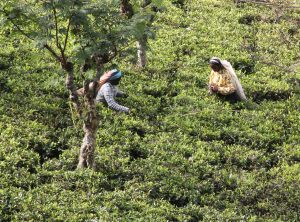Only 10 countries in the world offer full legal protections to women, according to the “Women, Business and the Law 2021” report, published recently by the World Bank. Sri Lanka scores just 65.5 on the index falling behind its neighbors India, the Maldives, and Nepal, and other nations like Saudi Arabia and China. One area where it scores low is assets, partly due to gender differences in land ownership and inheritance.
“There are large gender disparities in access to and control over resources (e.g. land, water and inputs), access to markets and access to skills training, all of which are critical for agricultural production and livelihoods,” writes the Food and Agriculture Organization (FAO) of the United Nations. Only 16 percent of all privately owned land in the country belongs to women, according to the FAO.
Land ownership can often serve as a safety net for women and help navigate changing social structures and traditions. Lack of land ownership often limits female farmers’ ability to obtain agricultural assets, services, and benefits. For instance, irrigation organizations accept registration only from farmers who own land for growing paddy rice. Hence, women without titles to the land have no formal access to government provided water.
“Because women’s land rights are not protected by the law, they are inadvertently vulnerable and unable to access formal institutions. They have to rely on informal credit institutions with higher interests, leading to higher debts for women,” Sathya Karunarathne, research executive at Advocata Institute, a policy think tank in Colombo, Sri Lanka, told The Diplomat.
Sri Lankan law is a highly complex mix of legal systems made up of Roman-Dutch civil law, English common law, and customary laws – Kandyan, Thesawalamai, and Muslim laws. The lack of a uniform law to govern women’s land rights and contradictory and complex legal provisions are a further problem. Region, ethnicity, and religion all play a part in whether a woman inherits family land in Sri Lanka.
“Despite the Sri Lankan constitution being non-discriminatory regarding land ownership, several aspects of the general and customary laws allow for unequal inheritance and land ownership practices to continue and limit women’s access to land,” said Karunarathne.
In the general law, Schedule 3 of the colonial-era Land Development Ordinance prescribes an order of inheritance giving precedence to male heirs over female heirs when the owner dies. Women can be ousted by male relatives even when they were cultivating the land due to the bias in this statute. A man’s remarriage would also leave the first wife with no claim to the land although they might have jointly cultivated it.
In customary laws like the Kandyan personal law that applies to the Kandyan Sinhalese population, women’s inheritance right is influenced by the origin of the property in question. While sons and daughters inherit their parents’ property in equal shares, a daughter who marries into a “deega” family arrangement — a patrilocal arrangement in which the married couple reside with the husband’s family — must transfer any immovable property she inherited from her father to her brothers, unmarried sisters, or sisters who have married into a matrilocal family arrangement after the death of her father. For the Sinhalese who are not Kandyan or who opt out of the Kandyan Act, widows inherit one half share and the other half is shared among descendants (sons and daughters) under the Matrimonial Rights and Inheritance Ordinance.
Under the Muslim law, even though women may own property, her husband may use this property to earn an income without sharing any part of the earnings with his spouse. Other discriminatory practices include a daughter receiving a lesser share of inheritance than a son; a widow inheriting half the portion that a widower would inherit; and the mother of the deceased being entitled to half of the share of the father of the deceased.
In the Thesawalamai law that applies to Sri Lankan Tamils in the country’s north, a women’s guardianship passes from father to husband. Married women require their spouse’s permission to dispose of any property — even the land they may have brought into the marriage.
The applicability of this law in the post-war context of Sri Lanka is particularly troubling as women who have become heads of the household after the arrest or disappearance of their husbands are unable to sell their property without the husband’s consent. While women can apply to the District Court for an order to vest the relevant property in their names, legal barriers like loss of documentation (marriage certificates), high cost of litigation, limited mobility, and delays in the justice system act as major deterrents in their pursuit.
Landlessness due to natural calamities and war remains high in Sri Lanka. Many land title records were also lost during the Sri Lankan civil war and significant disputes over property ownership remain a decade after the war. Over two-thirds of returning refugees who fled the war are landless and nearly 30,000 people are still considered internally displaced, according to the news outlet Al Jazeera.
The idea of “guardianship” of the women and their assets by men in these personal laws is a major hurdle for women’s empowerment. Sociologist Elisa Scalise also finds that the practice of dowries in South Asia is a major impediment to land ownership and inheritance for women. Families often view their daughter’s dowry, given to her husband and his family, as her inheritance. Despite being prohibited by law, the cultural practice remains prevalent in the region.
“It is oppression that you have such laws. It is dehumanizing,” said Karunarathne. “We live in 2021 and women are still made to feel vulnerable by the legal system.”

































